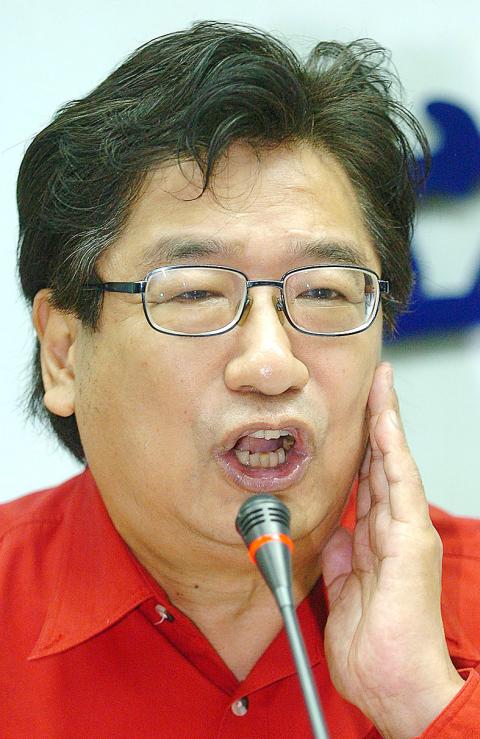Former Chinese Nationalist Party (KMT) legislator Lee Ching-hua (李慶華) was yesterday indicted on corruption charges for allegedly embezzling NT$5.23 million (US$169,772 at the current exchange rate) in government funds.
Evidence collected in an investigation pointed to Lee having pocketed government money earmarked for his office assistants’ salaries while he served as a lawmaker from 2007 to 2016, the New Taipei City District Prosecutors’ Office said.
Lee was charged with contravening provisions of the Anti-Corruption Act (貪污治罪條例), as well as obtaining property by fraud through abuse of a public functionary’s authority and making false entries in a public document under the Criminal Code.

Photo: Liu Hsin-de, Taipei Times
Lee first served as a KMT lawmaker from 1992 until 1996, when he joined the New Party. He later switched to the People First Party (PFP), before returning to the KMT in 2005. He then served as a KMT legislator until he failed to secure a seat in the 2016 legislative elections.
Lee allegedly used the names and bank accounts of his office staff’s wives to create shell accounts, which he registered with the Legislative Yuan to receive monthly government subsidies earmarked for the salaries of lawmakers’ assistants.
Six members of Lee’s office staff during his final 10 years in office told prosecutors during questioning that they had not received any of the funds, which were collected by Lee.
The owners of the shell accounts admitted during questioning that they did not work at Lee’s legislative office, did not hold jobs at any of his constituent office and did not conduct any work for Lee, investigators said.
The investigation found that most of the money went toward alimony payments to Lee’s ex-wife, while he used the rest on personal expenditures, prosecutors said.
One of senior office aide, surnamed Yin (殷), testified that he was instructed to cooperate in the scheme by providing his wife’s name to set up a bank account, which Lee would use to collect the money.
Asked about Lee’s case, Legislative Speaker Su Jia-chyuan (蘇嘉全) said: “Lawmakers should spend the subsidies on their assistants’ salaries, which is their intended purpose. The rules are clear on this, and we hope everyone can follow the rules.”
“Many candidates running for city or county councilor posts in the upcoming elections have records for buying votes or defrauding public funds meant to pay for their assistants’ salaries,” New Power Party Legislator Hsu Yung-ming (徐永明) said.
“The public cannot accept this practice, but some political parties continue to nominate these people to run, so they should bear the responsibility,” Hsu said.
Lee’s younger sister, Diane Lee (李慶安) — who served three terms as a legislator for the KMT and later the PFP from 1999 to 2008 — was in 2010 convicted of fraud and forgery.
She also received a two-year sentence for covering up since 1994 that she had obtained US citizenship in 1991, which allowed her to be elected as a Taipei City councilor and later as a legislator.
However, upon appeal, the Supreme Court in 2011 acquitted her, although the case has remained highly contentious in political circles and among the public.

Taiwanese can file complaints with the Tourism Administration to report travel agencies if their activities caused termination of a person’s citizenship, Mainland Affairs Council Minister Chiu Chui-cheng (邱垂正) said yesterday, after a podcaster highlighted a case in which a person’s citizenship was canceled for receiving a single-use Chinese passport to enter Russia. The council is aware of incidents in which people who signed up through Chinese travel agencies for tours of Russia were told they could obtain Russian visas and fast-track border clearance, Chiu told reporters on the sidelines of an event in Taipei. However, the travel agencies actually applied

Japanese footwear brand Onitsuka Tiger today issued a public apology and said it has suspended an employee amid allegations that the staff member discriminated against a Vietnamese customer at its Taipei 101 store. Posting on the social media platform Threads yesterday, a user said that an employee at the store said that “those shoes are very expensive” when her friend, who is a migrant worker from Vietnam, asked for assistance. The employee then ignored her until she asked again, to which she replied: "We don't have a size 37." The post had amassed nearly 26,000 likes and 916 comments as of this

New measures aimed at making Taiwan more attractive to foreign professionals came into effect this month, the National Development Council said yesterday. Among the changes, international students at Taiwanese universities would be able to work in Taiwan without a work permit in the two years after they graduate, explainer materials provided by the council said. In addition, foreign nationals who graduated from one of the world’s top 200 universities within the past five years can also apply for a two-year open work permit. Previously, those graduates would have needed to apply for a work permit using point-based criteria or have a Taiwanese company

The Shilin District Prosecutors’ Office yesterday indicted two Taiwanese and issued a wanted notice for Pete Liu (劉作虎), founder of Shenzhen-based smartphone manufacturer OnePlus Technology Co (萬普拉斯科技), for allegedly contravening the Act Governing Relations Between the People of the Taiwan Area and the Mainland Area (臺灣地區與大陸地區人民關係條例) by poaching 70 engineers in Taiwan. Liu allegedly traveled to Taiwan at the end of 2014 and met with a Taiwanese man surnamed Lin (林) to discuss establishing a mobile software research and development (R&D) team in Taiwan, prosecutors said. Without approval from the government, Lin, following Liu’s instructions, recruited more than 70 software